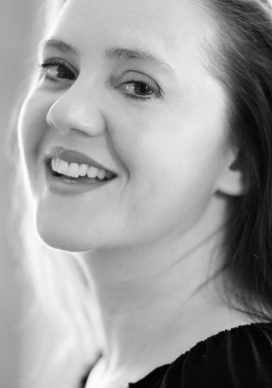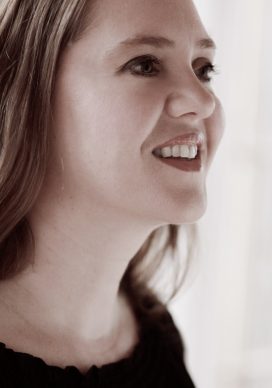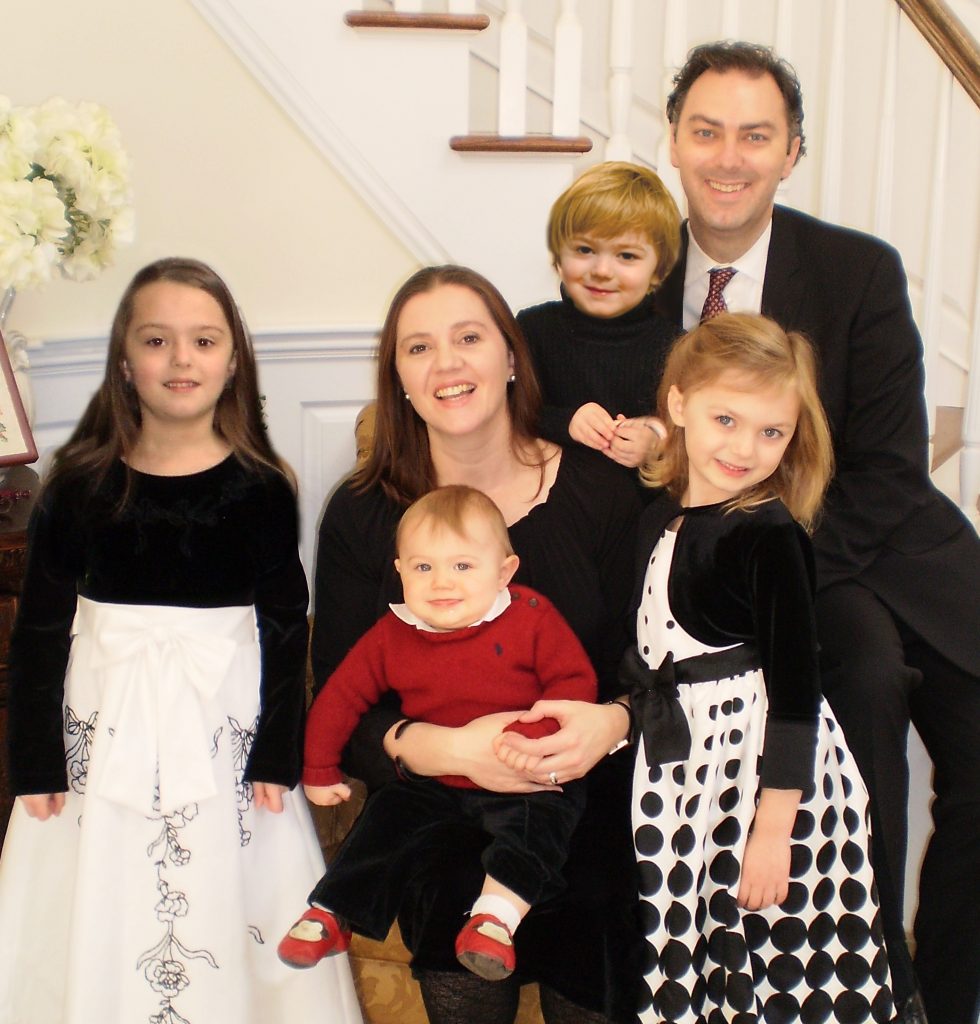February 11, 2010, Darien, Connecticut
Over a period of about ten years, Chrysula Winegar transitioned from being single and in a busy career in Sydney, London and New York, to being married with four children and consulting and blogging from home. Chrysula discusses why she made the choices she did, and how balancing her former self with who she is today is so important to her.
Everything rides on my decision to have four children. I felt I needed to have four kids, and I didn’t feel complete until the fourth one came. I can’t really explain that decision in any kind of rational or logical way. I can only explain it in the traditional Mormon framework: I knew that there were four children who were entrusted to me and who needed to be part of this family.
My decision to maintain my career was a very rational, economically-based choice at the time. I was married at the age of 30, and I always intended to stay home with my children. However, right as I had my first child, my husband was launching his own business, so it made sense for me to stay at my job as International Marketing Manager with Aveda Corporation, part of the Estee Lauder Companies. I really enjoyed it, although it wasn’t my passion. I stayed in that role, progressed in it, and was promoted, while my husband started his business and took on the majority of household administration and managed our baby’s day care schedule.
I love being a mother and I love my children, but I don’t love mothering per se. I find that constantly meeting the needs of a child is extremely difficult. I’m not a naturally playful person. It’s not instinctive for me to get on the floor to play. I have to make very conscious decisions to do those traditional “mommy” activities. I don’t like to bake. Making cookies with my kids is a nightmare for me! That’s stuff that I have to schedule in my diary and make happen, because it’s not instinctive for me. As I more consciously mother, I am finding greater joy in those small activities along the way, but it’s a work in progress.
So at what point did you decide to step out of full-time work?
I had my second child—so I had two daughters by then—and the transition from one to two children was tough for me. After maternity leave, I went back to work. It was really hard. The conclusion that my husband and I came to was that it just wasn’t working; I felt like I was missing out on too many things. A few months after returning to work, I was offered two possible promotions, one of which was my dream job. That one would have required relocating to Minneapolis and the other would have required extensive international travel. Neither of those options would have worked for my family. My husband’s career is in the art world, and his whole network is in New York City, so moving to Minneapolis was out of the question. And I wasn’t willing to regularly travel internationally with two babies at home. The decision was a no-brainer at that point. I cried for two days and then I resigned. After grieving for those professional roles, I felt fine; I didn’t feel forced into a corner, and I was really happy to be at home with my girls. For the next couple of years, I didn’t really think about anything else other than being home full-time with them, running my household, and supporting my husband’s business, doing his administration and marketing communications. In the meantime he started a corporate role.
After a couple of years, I started getting a little bit antsy. I was pregnant with my third—our first son—and had even started praying about it: “What is next, Lord?” During that time, my husband had a job that required him to travel more than half of the year, and he was also in the bishopric of a singles’ ward. I was essentially on my own most of the time, and that probably compounded some of this thinking for me. So I’m about to have my third child, and am having all of these “ifs, buts, and maybes” in my mind. Then the stake presidency called me in for an interview. They said to me, “We have been given this answer three times, and every time we’ve said, ‘We can’t do this to this poor woman,’” because my husband traveled and was in a bishopric, I was about to have my third child, and we were living in 750 square feet in Manhattan. But they said, “We feel very clearly that you’re the person for this calling,” and they called me to be the Director of Public Affairs for the New York New York Stake. After my initial shock, I thought, “Oh, thank you, Heavenly Father, you know me so well.” Because what I needed was a seat at the table, and this gave me that.

I had been missing meetings. I had been missing dialogue. I had been missing brainstorming, and important conference calls that had to happen right at that moment. I had been missing writing. It was right in the middle of Mitt Romney’s campaign, so the church was receiving a lot of media attention and inquiry and it was a dynamic time to be involved in public affairs. The role put all of my corporate skills to use. It was absolutely the hand of the Lord. It was a great experience.
You have started doing more in relation to work/life balance issues. How did that start?
Those issues have always been in the background. I was a recruiter in my early life, and I have always been interested in the questions of “Why do people do what they do?” and “How have they gotten to this point?” I was always fascinated by others’ career paths and the accidental jobs that people picked up that changed their lives and pushed them down a certain pathway. Because of this interest in human behavior in the workplace, I had done a master’s degree in Organizational Behavior in London in my late twenties, and within that degree I focused on work/life issues, along with training and development, which go hand in hand. But I couldn’t find a job in that area when I moved to New York City initially in 2000: companies weren’t really interested in it and didn’t have money for it. So I ended up back in marketing instead. I always knew that I wanted to do more around work/life issues, so I’ve kept up on the conversation and the policies. The public affairs calling is now gone, and so right now, I’m beginning a work/life consultancy practice and writing curriculum for some training programs that will be really powerful. If I’m going to invest time and effort away from my family, it has to be something I really care about.
You also started to blog about work/life issues in Fall 2009. Why did you start to blog and how has it helped you maintain your sense of self?
For a long time, I hadn’t really gotten into blogging at all, and I had resisted Facebook and Twitter. I think it was a spiritual prompting for me to get involved, and I felt like this was a way that I could progress my ideas and explore some of the concepts that were important to me. I’ve been thinking about some of these work/life ideas for 20 years, but I haven’t always spoken up about them. When I turned 30, I started to feel like I no longer needed to be frightened of my opinions or who I am. Then I got married and had children, and those years in my late thirties were a blur. But when I turned 40 and had my last child, I felt like I entered a new phase; it intensified those feelings of “I do not need to hide my opinions. I’m smart, my opinions are informed. It’s okay to share them, it’s okay to have a platform, and it’s okay to have an agenda.”
I’m really honored when people read my blog. I have a small following by most comparisons, but I’ve also built connections through Twitter. I just had lunch with eight women in New York City who are all making huge contributions to the work/life debate in different ways. We’re trying to put together a conference, and I’ve been invited to write on a few other blogs. I’m building relationships that help this message get out there. I have a seat at the table, and if I hadn’t opened my mouth six or seven months ago, I wouldn’t be there.
You write about balancing the different parts of your life. What are the challenges and victories in your own quest to balance home life and professional pursuits? Are there certain things you’ve had to sacrifice or certain keys to your being successful?
Right now, I’m not as great of a homemaker as I’ve been in the past. This is hard for me—I can’t stand a dirty floor—but I’ve had to let things go, because I’m making different choices. It’s a clichéd piece of counsel, but you have to prioritize, and for me, the way my household looks has gone down the list in recent months as I’ve upped the ante on my writing and other professional pursuits.
I also think you need to be realistic about what you can and cannot do. It’s important to abide by the Word of Wisdom, and also the verses in D&C 88 that talk about getting enough sleep. For a while, I was staying up late every night, because there is so much I am hungry to do, and I was trying to feed my brain in the hours that I could. But I kept getting sick, and it wasn’t fair to my kids, my marriage, or me. So I’ve had to learn to shut down and say “no” to certain things, even if that means saying “no” to myself.

Lastly, we hear it all the time, but it’s true that there are different phases to life. Right now, my kids are little, ages 7, 5, 3, and 1. It’s crazy, but motherhood is not always going to be this intense. I don’t need to launch a full-scale business at this particular point; I just need a toe in the water right now, so that I’m ready when I want to grow it to something bigger.
I had my first child at age thirty-four, and then another at thirty-six, thirty-eight, and forty. Having kids close together is a recipe for insanity, but then you’re on the next ticket. I couldn’t do the baby thing forever; I feel at peace about moving to the next phase. I grew up the same way; my mom had four kids in four years. It was phenomenal; we were very close.
Related to this idea of balance, you have also written about the various pieces of counsel that are given to Mormon women: to be prepared, to get as much education as we can, to work hard, to nurture our families. These messages can seem contradictory at times. How do you reconcile them?
In our theology, we have clearly stated roles about who provides and who nurtures, and I value that. None of my input into this conversation is ever intended to devalue those stated goals. But women have always worked: the pioneer women did sewing, took in extra laundry, cared for animals, and so on. Yes, this work was often done from their homes, but they worked. Today, we’ve become quite linear about how we define work. We all work—whether for money or not; it’s part of our DNA as Mormons. I worry that we’ve become a bit hung up on this and are too quick to judge.
I worry when I see Mormon women stepping away from the workforce early in their lives and not maintaining their skills. Our marriage percentages are not that much better than the world’s. Certainly they are for temple marriage, but not by as much statistically as you would hope. There are many women who are unprepared for sudden death or a revealed affair or simply unemployment…and suddenly a marriage is in tatters or under great pressure and there are children, and the woman isn’t equipped to take over. This whole idea of preparedness and education is strong in our church. All this might mean is subscribing to an industry publication or taking an occasional class or reading once or twice per week in an online forum about the latest developments in your area. Just don’t close that door. I get frightened when women do that to themselves.
It’s not only fiscally and economically healthy to maintain your skills, but it’s also mentally healthy to have a connection with the world. We need to go back to our history and look at our female ancestors, and we’ll see that they always worked. There are alternative ways—besides working full-time—to stay in the game.
What advice would you give to other women who are struggling to balance the many roles and expectations for Mormon women?
It would be to never stop reserving a corner of what it is you might do on the side. Be creative. Don’t be frightened to be interested in something outside of your children. Mormon women are really good at frugality—at scrimping, saving, and cutting back. But we’re not so good at investing, growing, and managing our money. I certainly think that women should understand where their money is going and make some effort to be financially aware. Figure out what discretionary time you have and enhance your skill set, whether it’s through taking a class, reading a publication, or joining a forum for an area of interest that you could turn into economic advantage down the road. I’m not saying, “Go out and get a job tomorrow.” I’m saying, “Find a way to stay connected.”
It’s also important to counsel with your husband. I have a very supportive man at my side, but we’ve had to have some painful conversations about prioritizing what’s most important to our family. We’ve been prayerful about it and tender with each other. He’s my biggest fan and cheerleader, but it’s a work in progress for us; we’re making it up as we go along. We are open with each other and involve the Lord in determining what is right for our family.
Finally, it’s critical to counsel with the Lord and to be open to personal revelation about the best path for you. It’s important to me to remember that the Lord knows who I am in my absolute core much better than I know who I am in my absolute core. He is going to send me opportunities that are right for me and that will ultimately bless my family, as long as I work hand in hand with Him.
At A Glance
Chrysula Winegar
 Location: Darien, CT
Location: Darien, CT
Age: 41
Marital status: Married
Children: Four children ages 7, 5, 3, and 1
Occupation: Mother and work-from-home consultant
Schools Attended: University of Queensland, University of London
Languages Spoken at Home: English
Favorite Hymn: “Be Still My Soul”
Current Church Calling: Relief Society Teacher, Activities Co-Chair
On the Web: www.wlbconsultants.com
Interview by Barbara Christiansen. Headshot photos by Michelle Catherine Photography.
At A Glance

